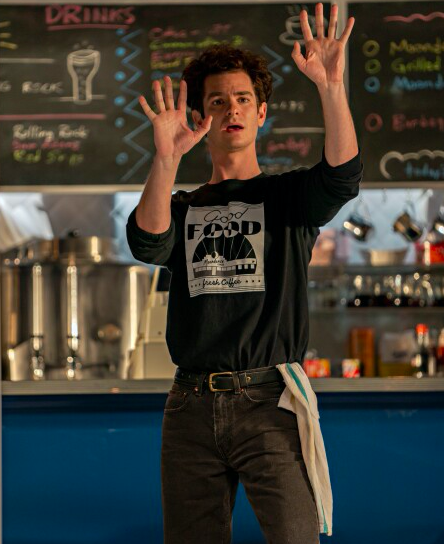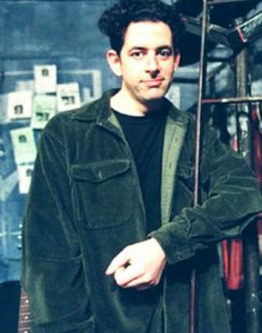In Shadow, Insieme
I started this day obsessing over a missing fur muffler. Then I decided the remedy for such heedless materialism was a Stephen Sondheim deep-dive. I was mainlining everything by the recently deceased lyricist/composer when I learned one former suitor had just lost everything in a fire, another had died suddenly of a heart attack. With both people, my ego needs often eclipsed my compassion. Praying for their peace, I shook my head over the big deal I’d just been making over a scarf—not to mention the raw, unmatched longing derailing both relationships. Had this intuitive learned nothing? I flashed on how being unwanted by his mother had lent that same longing to all of SS’s productions, including Marriage Story, which in its own way is also a Sondheim production—at least in this (and one other) scene.
In the rest of Noah Baumbach’s thinly disguised account of his divorce, Adam Driver channels the writer/director’s fussy, righteous narcissism. But in this rendition of “Being Alive,” the actor channels Sondheim instead—namely, the redemption he personally experienced through Sondheim’s work, through theater in general. A former Marine who found outlet for his many variations of manhood at Juilliard, Driver captures that desperate desire to transform pain and isolation into something—anything!—so there’s meaning in despair.  It’s a performance that embraces each of us in our imperfections. A performance that reaches across time and space.
It’s a performance that embraces each of us in our imperfections. A performance that reaches across time and space.
At heart, “compassion” simply means “suffering with.” On this first night of Hannukah, the Jewish commemoration of light in the darkness, know that you are loved, you are whole, you are held. Above all, you are not alone.
Thanksgiving Falls on Every Day of My Calendar
 I got up early, watched the sunrise with coffee and permakitten, drove over to Queens in Minerva, my trusty blue hatchback, and took a long hike through Forest Park, listening to the birds and squirrels and wind and leaves, meditating by the pond as the whippoorwills and a potbellied homo sapien practiced their scales. On the way home I stopped off at Trader Joe’s to fetch things I’ll want to eat on the Thursday formerly known to me as Thanksgiving, and joked with cashiers whom I’ve come to know and adore. It was a simple morning, but so meaningful and joyful because it was entirely on my terms.
I got up early, watched the sunrise with coffee and permakitten, drove over to Queens in Minerva, my trusty blue hatchback, and took a long hike through Forest Park, listening to the birds and squirrels and wind and leaves, meditating by the pond as the whippoorwills and a potbellied homo sapien practiced their scales. On the way home I stopped off at Trader Joe’s to fetch things I’ll want to eat on the Thursday formerly known to me as Thanksgiving, and joked with cashiers whom I’ve come to know and adore. It was a simple morning, but so meaningful and joyful because it was entirely on my terms.
Only very very recently could a woman could live by herself, drive a car she bought herself with money kept in a bank account with only her name on it. Even more miraculous: I finance my existence with work I feel called to do that once upon a time would’ve got me burned at the stake.
Given our country’s history of genocide and colonization–and given my complicated personal relationship to the Thanksgiving holiday–I’ve come to treat the last Thursday of November as a quiet and solitary day of reflection. I go for a long city walk, I say hi to the river, I slow-roast local vegetables, I pay my respects to this land that has seen so much harm since Europeans’ arrival. And then I watch really raggedy, emotionally complicated films like Lumet’s The Morning After,  in which Jane Fonda plays a drunken former actress framed for murder on Thanksgiving Weekend.
in which Jane Fonda plays a drunken former actress framed for murder on Thanksgiving Weekend.
It’s been a year since I injured my back so badly I was immobilized; two years since I was so broke I was afraid I would lose my home. Now, through the support of friends, healers, and my own adjustments, I can stand on my two feet again. I’m profoundly grateful I can freely move through this world’s extraordinary-ordinariness on my own terms. There is always so much beauty and love to be honored
Every day of the week, I’m so grateful to be grateful.
No Day But Today (‘Tick, Tick…Boom’)
 I saw Tick Tick…Boom! this afternoon at the newly reopened Paris Theater and it was the first film I’ve seen in years where the audience, unprompted by the presence of cast/crew (I see a lot of press/industry screenings), burst into spontaneous applause.
I saw Tick Tick…Boom! this afternoon at the newly reopened Paris Theater and it was the first film I’ve seen in years where the audience, unprompted by the presence of cast/crew (I see a lot of press/industry screenings), burst into spontaneous applause.
Given that the musical, written by Rent composer and playwright Jonathan Larson, centers on Larson’s struggle to write and produce a musical, it easily could have devolved into a super-grating ouroboros. In the hands of anyone more narcissistic or nihilistic (Charlie Kaufman), it would have. Instead Tick Tick illuminates how creating art—creating anything—invites us to move beyond projection and self-aggrandizement into communion with each other and the love always moving through everything.
Exactly what we need in these dystopian times.
Shoulder to shoulder, ogling a big screen only blocks from Times Square, we in that hodgepodge audience reconnected with the irreplaceable joy of being part of art simply by fully experiencing it, and were briefly united as one. It underscored how grateful I felt to still be in NYC, one of the few places Trumpism could never infect (a place from which he beat a hasty retreat) because it relies on that shoulder-to-shoulder coexistence—no one more important, everyone a star of their own uniquely technicolored musical. A place where we’re all performance artists just by showing up at the plate, and grudgingly loving each other for it.
Which loops back to diehard New Yorker Larson, who delighted in making and embodying art, not just wrapping it up with a bow and delivering it somewhere slick. Who embraced the joy of trying, no matter the result, and the inevitable shock of change, even his own demise. Who built worlds celebrating that joyful, grueling praxis.
Thus his death at 35, right before Rent ever saw a real audience, was not a sad story so much as uniquely his story. The crescendos always as important as the climax. The grace notes not codas so much as bittersweet refrains.  Not untimely at all, but linked into kairos, also known as soul time– what truly endures.
Not untimely at all, but linked into kairos, also known as soul time– what truly endures.
Utopia (noun). Perfect place. No place. A place to which we’re always striving.
More than any moment in my memory, we Americans need to thread back to each other and our best selves. And from the other side, aided by Lin-Manuel Miranda and his fabulously staged cast (a “Moonlight Diner” scene alone is worth the price of admission), Larson still is activating that American experiment. If you can, see this film on a big screen, for the full re/sourcery of real life as magic and magic as real life. Even if you’re alone as I was–especially then, maybe–it will reconnect you to the intimacy of strangers, arguably the most beautiful artwork of them all. You may know it as the social contract.
Utopian, indeed.
